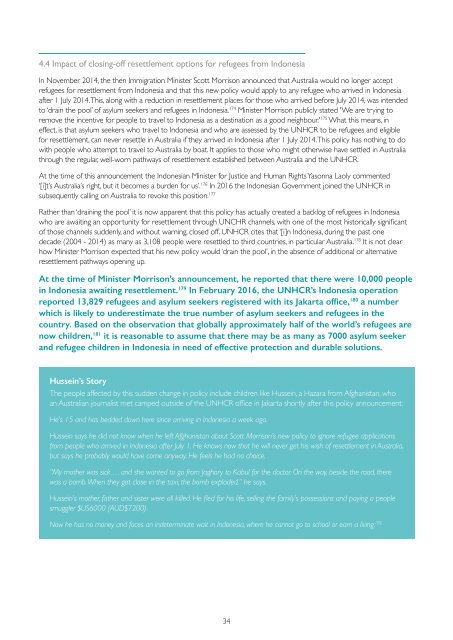AT WHAT COST?
At-What-Cost-Report-Sept-2016
At-What-Cost-Report-Sept-2016
Create successful ePaper yourself
Turn your PDF publications into a flip-book with our unique Google optimized e-Paper software.
4.4 Impact of closing-off resettlement options for refugees from Indonesia<br />
In November 2014, the then Immigration Minister Scott Morrison announced that Australia would no longer accept<br />
refugees for resettlement from Indonesia and that this new policy would apply to any refugee who arrived in Indonesia<br />
after 1 July 2014. This, along with a reduction in resettlement places for those who arrived before July 2014, was intended<br />
to ‘drain the pool’ of asylum seekers and refugees in Indonesia. 174 Minister Morrison publicly stated 'We are trying to<br />
remove the incentive for people to travel to Indonesia as a destination as a good neighbour.' 175 What this means, in<br />
effect, is that asylum seekers who travel to Indonesia and who are assessed by the UNHCR to be refugees and eligible<br />
for resettlement, can never resettle in Australia if they arrived in Indonesia after 1 July 2014. This policy has nothing to do<br />
with people who attempt to travel to Australia by boat. It applies to those who might otherwise have settled in Australia<br />
through the regular, well-worn pathways of resettlement established between Australia and the UNHCR.<br />
At the time of this announcement the Indonesian Minister for Justice and Human Rights Yasonna Laoly commented<br />
‘[i]t’s Australia’s right, but it becomes a burden for us’. 176 In 2016 the Indonesian Government joined the UNHCR in<br />
subsequently calling on Australia to revoke this position. 177<br />
Rather than ‘draining the pool’ it is now apparent that this policy has actually created a backlog of refugees in Indonesia<br />
who are awaiting an opportunity for resettlement through UNCHR channels, with one of the most historically significant<br />
of those channels suddenly, and without warning, closed off. UNHCR cites that ‘[i]n Indonesia, during the past one<br />
decade (2004 - 2014) as many as 3,108 people were resettled to third countries, in particular Australia. 178 It is not clear<br />
how Minister Morrison expected that his new policy would ‘drain the pool’, in the absence of additional or alternative<br />
resettlement pathways opening up.<br />
At the time of Minister Morrison’s announcement, he reported that there were 10,000 people<br />
in Indonesia awaiting resettlement. 179 In February 2016, the UNHCR’s Indonesia operation<br />
reported 13,829 refugees and asylum seekers registered with its Jakarta office, 180 a number<br />
which is likely to underestimate the true number of asylum seekers and refugees in the<br />
country. Based on the observation that globally approximately half of the world’s refugees are<br />
now children, 181 it is reasonable to assume that there may be as many as 7000 asylum seeker<br />
and refugee children in Indonesia in need of effective protection and durable solutions.<br />
Hussein’s Story<br />
The people affected by this sudden change in policy include children like Hussein, a Hazara from Afghanistan, who<br />
an Australian journalist met camped outside of the UNHCR office in Jakarta shortly after this policy announcement:<br />
He’s 15 and has bedded down here since arriving in Indonesia a week ago.<br />
Hussein says he did not know when he left Afghanistan about Scott Morrison’s new policy to ignore refugee applications<br />
from people who arrived in Indonesia after July 1. He knows now that he will never get his wish of resettlement in Australia,<br />
but says he probably would have come anyway. He feels he had no choice.<br />
“My mother was sick . . . and she wanted to go from Jaghory to Kabul for the doctor. On the way, beside the road, there<br />
was a bomb. When they got close in the taxi, the bomb exploded,” he says.<br />
Hussein’s mother, father and sister were all killed. He fled for his life, selling the family’s possessions and paying a people<br />
smuggler $US6000 (AUD$7200).<br />
Now he has no money and faces an indeterminate wait in Indonesia, where he cannot go to school or earn a living. 182<br />
34


